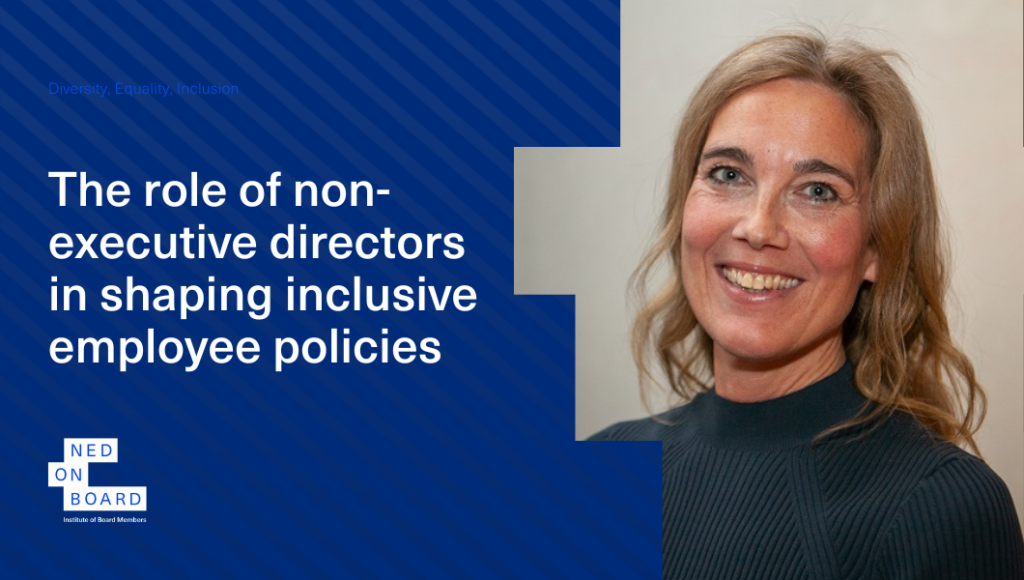Employee policies reflect how a firm treats its employees and its approach to diversity, equity and inclusion (DEI). While non-executive directors are not responsible for drafting policies, it is important these align with your own values and beliefs. Are policies reflective of a firm you would be proud to act as a non-executive director for? Are they sustainable? If not, how can you help shape them for the future? An important recent policy that offers a more inclusive workplace for mothers and fathers is the 2015 UK shared parental leave policy.
Background
The government determines the legal framework within which firms operate and the board of directors need to consider policy changes as it oversees corporate strategy. Governments tend to approach the consistent underrepresentation of women board directors and senior leaders in two main ways.
- Board gender quotas. Following the 2003 Norwegian quota, ten European countries had introduced quotas by 2015. Countries like the UK has instead opted for a recommendation-based approach for increased female directorships.
- Gender equal policy making. According to the World Bank only 14 (7%) of the world’s 195 countries had gender equal policies in 2023 (The World Bank, 2023). Much of the current inequality affect women’s career opportunities and support those of men. A key element to gender equal policy making is the rights for both fathers and mother to take parental leave, which is the focus for this research.
There is a key difference between the two approaches. While quotas force firms to recruit more women, shared parental leave creates more equal opportunities for both genders should they choose to parent.
Until 2015 UK fathers had the legal right to take 2 daddy weeks. The remainder of leave was earmarked for mothers. Shared parental leave (SPL) introduced in 2015 in the UK changed this. Fathers can share 50 of the 52 weeks of leave awarded to new parents. The UK stated its intentions for SPL to change workplace culture which would be “good for families, good for business and good for the economy” (UK Government, 2014). Because SPL brings benefits for both fathers and mothers to plan their career – family life balance, we believed that this would successfully unlock more egalitarian leadership qualities among female and male leaders.
Women and men as board directors
There are widely documented differences in the leadership styles of women and men, and when it comes to board directors, women are often accredited with excellent corporate governance skills. Compared to men, women board directors focus more on long-term firm performance, contribute to reduced risk taking, improve financial transparency, reporting, monitoring and performance accountability as well as increase firms focus on corporate social responsibility, human resources and sustainability (Cook & Glass, 2018; Girardone et al., 2021; Manso, 2011; Yang et al., 2019). Despite bringing such valuable skills, simply placing more women on boards does not necessarily mean better firm performance. Research links this to the still few women directors not being awarded enough power to affect strategic change (Martínez‐García et al., 2022), something which is linked to a remaining bias against female leaders and directors, a bias that permeates society whereby we grant male opinions more influential power (Baeckström, 2022).
Can board members be influenced
Government policy can influence public opinion (Soss & Schram, 2007) and people’s beahviour. The UK Government introducing shared parental leave might therefore influence corporate leaders and increase general acceptance of gender (and family) equality among leaders regardless of their gender. Researchers have proven that male leaders increase their attention to corporate governance after their interest in gender equality is evoked. Examples include male leaders increasing their firms’ CSR ratings, reducing the executive gender pay gap being generally more supportive of workplace gender equality after having daughters (Cronqvist & Yu, 2017; Dahl et al., 2012). That such parenting experience evokes greater interest in DEI and corporate governance suggest that leadership traits are flexible and can be influenced by outside stimuli and that male leaders can display traits that are usually associated with female leadership.
The study
In a joint research project, Dr Onur Kemal Tosun (Cardiff University), and I examined UK firms and interviewed UK board directors. We revealed that firms with exclusively male directors have higher financial performance than companies with mixed gender boards after the introduction of shared parental leave. The largest performance improvements are found in firms whose male directors work closely with female directors on other boards. Our interviews showed a trend towards increased board director attention to DEI in recent years. The directors we spoke to confirmed that government policies and society sentiment affect board level discussion. Increased focus on DEI brings benefits for corporate governance practices, something which is positive for financial management, work with staff and clients and therefore also firm performance. However, the interviews also demonstrate that gender bias still exists and that female directors are sometimes appointed to ‘meet targets’, leaving the power mainly with male directors and in particular the, often male, chair.
Our study therefore concludes that increased attention to DEI can improve corporate governance practices with performance benefits to firms if influential power is awarded appropriately. Evaluating colleagues based on their skills and merits rather than their demographics can help firms to improve the sustainability and performance of their firms.
Dr Ylva Baeckström is a former banker and fintech entrepreneur, now a psychotherapist, and academic at Kings College London. Ylva’s research is in behavioural and sustainable finance. She is an expert on financial advice, gender and intersectionality in financial services and entrepreneurship. With her work she aims to create positive impact for the benefit of society, businesses and individuals.
Related resources
Empowering NEDs to lead DEI and people strategies
The increasing role of NEDs in supporting DEI
Culture, diversity and inclusion for board members
Is your board equipped to lead on Diversity, Equity, and Inclusion? If you’re looking to enhance your board’s approach to DEI, book a call today to explore how tailored training can upskill your leadership team and foster a more inclusive workplace or visit our dedicated website page.
References
Baeckström, Y. (2022). Gender and Finance: Addressing Inequality in the Financial Services Industry. Routledge
Baeckström, Y. & Tosun, O. (2024). Shared Parental Leave, Male Board Directors, and Firm Performance: A Corporate Governance Perspective. Working paper
Cook, A., & Glass, C. (2018). Women on corporate boards: Do they advance corporate social responsibility?. Human relations, 71(7), 897-924.
Cronqvist, H., & Yu, F. (2017). Shaped by their daughters: Executives, female socialization, and corporate social responsibility. Journal of Financial Economics, 126(3), 543-562.
Dahl, M. S., Dezső, C. L., & Ross, D. G. (2012). Fatherhood and managerial style: How a male CEO’s children affect the wages of his employees. Administrative Science Quarterly, 57(4), 669-693.
Girardone, C., Kokas, S., & Wood, G. (2021). Diversity and women in finance: Challenges and future perspectives. Journal of Corporate Finance, 71, 101906.
Manso, G. (2011). Motivating innovation. The journal of finance, 66(5), 1823-1860.
Martínez‐García, I., Terjesen, S. & Gómez‐Ansón, S. (2022). Board gender diversity codes, quotas and threats of supranational legislation: impact on director characteristics and corporate outcomes. British Journal of Management, 33(2), 753-783.
Soss, J. & Schram, S.F. (2007). A public transformed? Welfare reform as policy feedback. American political science review, 101(1), 111-127.
The World Bank. (2023). Women, Business and the Law 2023. Retrieved from https://openknowledge.worldbank.org/server/api/core/bitstreams/b60c615b-09e7-46e4-84c1-bd5f4ab88903/content.
UK Government. (2014). Parents can now apply for Shared Parental Leave. Retrieved from https://www.gov.uk/government/news/new-shared-parental-leave-regulations-come-into-effect
Yang, P., Riepe, J., Moser, K., Pull, K. & Terjesen, S. (2019). Women directors, firm performance, and firm risk: A causal perspective. The Leadership Quarterly, 30(5), 101297.




